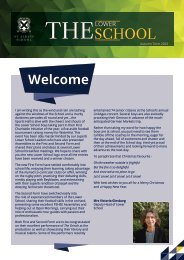Create successful ePaper yourself
Turn your PDF publications into a flip-book with our unique Google optimized e-Paper software.
40<br />
(infant death being common in this era) and a sheep<br />
acting strangely ‘skipping … on its head’ around<br />
her.<br />
Wenham knew her rights and dismissing the accusations<br />
of witchcraft that traduced her, obtained<br />
a warrant from the local Justice of the Peace to<br />
fight slander. She was awarded a shilling in compensation,<br />
suggesting those who were learned,<br />
using reason rather than rumour, were on her side.<br />
Wenham’s dismissiveness of the paltry sum and<br />
sly asides that ‘she would get justice elsewhere’<br />
suggests she knew how to play on the superstitions<br />
of her accusers and frighten them more. Wenham<br />
played the only strengths the underdog role had<br />
given her. She was a nuisance: she was poor and<br />
asked for assistance. This placed a burden on a<br />
small community like Walkern’s. Such vagrancy<br />
and vagabondage was not uncommon in this era of<br />
population growth, when climate change reduction<br />
in global mean temperatures meant there were fewer<br />
crops and less food to go around.<br />
The situation between Wenham and one of her<br />
previous accusers, Anne Thorn, did not settle. It<br />
is easy to understand personal slights continuing:<br />
people bear grudges and Wenham comes across as<br />
feisty and relentless. Thorn continued acquiesce<br />
to Wenham’s request for firewood: speedily vaulting<br />
gates, despite her dislocation injury, claiming<br />
she was still bewitched. Only this, she said, could<br />
explain her ability as she was temporarily ‘crippled.’<br />
However, the trial records show a crowd of<br />
the entire village following her as she completed<br />
her task and helped her finish it, egging her on. If<br />
the whole village was involved, might it suggest<br />
Wenham’s widespread need for charity was wellknown<br />
and resented. Might Anne Thorn’s final act,<br />
in front of a dwindling crowd of two, of trying to<br />
drown herself, be the coup de grâce of a drama in<br />
which her personal animosity with Wenham was<br />
about to be won? Teenage resentment sometimes<br />
has few boundaries when the melodrama is in full<br />
swing!<br />
Henry Chauncy, the local notable, issued a warrant<br />
for Wenham’s arrest on charges of felony<br />
and witchcraft, to await trial at the assizes in three<br />
weeks’ time and yet inexplicably the constable broke<br />
into Wenham’s home and took her to Anne Thorn’s<br />
residence. The anthropologist historian should be<br />
rightly suspicious that a legal writ was not carried<br />
out lawfully and that she was taken to her principle<br />
The <strong>Gateway</strong> <strong>Chronicle</strong><br />
accuser who then proceeded to scratch at her face<br />
fiercely, yet mysteriously ‘without drawing blood.’<br />
Though this adds to the litany of strange charges<br />
against Jane Wenham, the only sensible reasons one<br />
can conclude for doing this is that the constable was<br />
trying to get the pair to resolve their differences<br />
peacefully and without the need for a courtroom;<br />
here were two rivals who would not back down. I<br />
wonder if Jane Wenham really believed the charges<br />
had any substance. If they did, she would surely<br />
have been more contrite and to drop the charges,<br />
making up with Thorn as if her life depended upon<br />
it. As it was she appears sensible enough not to<br />
fight back.<br />
Therefore, one should conclude Jane Wenham was a<br />
brave woman who believed the reason and logic of<br />
the law would save her, just as it had when she won<br />
her slander case. Her feisty response when taken to<br />
apologise to Anne Thorn also reflects her sense of<br />
pride and self-worth. Just because she was poor was<br />
no reason to cast aspersions upon her.<br />
At her trial, Wenham was accused of being unable<br />
to say the Lord’s Prayer after several attempts but<br />
perhaps this is exaggeration. Wenham was bodily<br />
searched and found to have no marks of the devil.<br />
She offered to undergo the swimming test for<br />
proving she was not a witch but had been refused<br />
by her accusers: far better for them to take her to<br />
trial against the whole village, steeped as it was, in<br />
prejudice. Her accusers did not want her competing<br />
Right:<br />
Henry<br />
Chauncy,<br />
the notable<br />
who issued<br />
a warrant<br />
for<br />
Wenham’s<br />
arrest


















